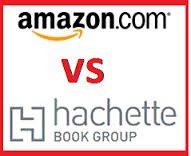|
Intense media coverage of the standoff between Amazon and French publisher Hachette over ebook pricing has called into question who will control the future of the book industry. This debate has historical precedent. The invention that enabled the creation of the modern book publishing industry – the Gutenberg printing press – was ridiculed at its inception by the prior gatekeepers of the printed word. Monks who transcribed scriptures and religious writings by hand once controlled both the editorial and distribution functions in what was the parchment, if not the book industry. As with Hachette today, it is understandable that artisanal monks felt threatened by a new technology, which allowed laypersons to print and distribute any document at far lower cost. We have seen similar cases of technological disruption throughout history, be it combine harvesters and threshers that accelerated the agricultural revolution at the expense of family farmers, or Sam Walton’s big box retailing innovations that dislodged thousands of mom-and-pop retailers, or Internet news aggregators that are posing grave threats to today’s metro and national newspapers. In each of these transitions, critics – either businesses directly disrupted by new technologies or citizens wedded to traditional mores — have rightfully called attention to what is being lost in exchange for supposed progress. For example, some critics of inaugural telephone services feared that families would become asocial, no longer needing personal visits to communicate with friends and neighbors. One can only imagine how such luddites would feel today about text messaging and social networking! It is ultimately up to the consumer marketplace, moderated as necessary by regulators and the courts, to decide on the pace and direction of technological progress. Under any circumstances however, new technologies that undermine historical bases of competitive advantage are highly disruptive not only to the incumbents’ business economics, but to their emotional well-being as well. If one has spent an entire career mastering complex skills and business relationships only to find these assets diminishing in value, the impacts are viscerally disorienting and threatening. These dynamics are once again at play in the negotiations between Amazon and Hachette. But the roots of this dispute go much deeper than ebook pricing terms, and the stakes pose an existential threat for book publishers. The question is, what can publishers learn from history to guide the way forward? To understand this high stakes game, it’s important to start with the historical context underscoring the publishing industry’s dilemma and challenge. For starters, the book publishing industry was caught in a broken business model of their own making, long before Amazon introduced its first Kindle in 2007. Decades ago, publishers adopted an inherently costly business model whereby books were sold on consignment to bookstores. With thousands of releases each year added to an even larger backlist, it has always been extremely difficult to predict the popularity of any given new title. Either bookstores or publishers had to assume the risk of getting new titles on retailers’ shelves. With production economics favoring large print runs, publishers bit the bullet, allowing free returns from bookstores, and have lived with the costly consequences ever since: return rates averaging 40% across the industry. Facing chronic slow growth and anemic profitability, independent publishers were acquired by large media conglomerates (e.g. CBS, Bertelsmann, News Corporation), who by 2000 controlled over 80% of total book production. Backed by stronger balance sheets, book publishers increasingly focused their efforts on blockbuster hits, funneling multi-million dollar advances to established authors. But as competition drove up the bidding, publishers continued to struggle to earn attractive returns, typically losing money on over 70% of new releases. Moreover bigger bets on populist blockbusters meant fewer resources were available to support up-and-coming authors with advances, marketing, PR and promotions. Thus the industry’s storied past of cultivating great literature has been under pressure for decades, quite apart from the threat of ebooks or Amazon. To compound their woes, book publishers failed to anticipate and have been slow to effectively respond to the transformation of the publishing industry in the post-Kindle era. In November 2007, Amazon CEO Jeff Bezos launched the original Kindle, surprising publishers with plans to price new ebook releases and best sellers at $9.99, well below the wholesale price publishers charged Amazon. With its aggressive, loss-leader pricing, wide selection and heavy marketing, ebook sales skyrocketed and Amazon’s market share reached nearly 90% within two years, alarming publishers. In response, in January, 2010, Hachette and four other publishers announced an agreement with Apple, whereby publishers would set retail prices for ebooks – typically 30% higher than Amazon’s prices at the time – giving retailers a fixed agency commission on each sale. But t he Department of Justice filed suit in April 2012, claiming Apple and the five publishers were guilty of collusive price-fixing. Hachette was one of three publishers that immediately chose to settle, restoring Amazon’s freedom to set ebook prices and agreeing to renewed negotiations after a two-year “cooling off” period, bringing us to today’s standoff between Amazon and Hachette. As digital penetration of the overall trade book industry approaches 50%, publisher profits have actually been strengthening, reflecting lower paper, print and binding costs and fewer unsold returns. But even if publishers temporarily succeed in maintaining their margins in the current round of negotiations, a far larger concern is the uncertain role legacy publishers will play, as printed books inevitably become an ancillary component to an ebook-dominated marketplace. The publishers’ longstanding source of market dominance has been their editorial gatekeeping function that historically dictated which books would be published at a scale requiring capital-intensive printing plants, and their distribution network that could rapidly place printed books on thousands of bookstore shelves. But with the advent of digital book production and distribution, these assets are no longer as valuable as they used to be, nor do they serve as effective barriers to competition. Thus, despite the recent tsunami of negative press being directed towards Amazon, this dispute is ultimately not about whether Amazon is a monopolist or monopsonist. Nor is it about whether Amazon is trying to use books as a loss leader to sell other merchandise or whether the company is treating Hachette, authors or its own customers fairly. It is also not about whether book publishers as currently configured are an essential bedrock of our society. It is about whether publishers can retool their business capabilities to maintain a vital role in adding value to all stakeholders in an industry where books will increasingly be produced, marketed, reviewed and sold in profoundly different ways. What does this mean in practical terms? Many authors who once would have been thrilled to be offered a legacy publisher contract are now asking: “what can you do for me that I can’t obtain elsewhere?” Publishers are quick to point out their longstanding editorial excellence, which will undoubtedly continue to be important. But to succeed in the post-digital era, publishers will also need to excel in customer relationship marketing, exploitation of social media, video production and promotion, multi-media web design and virtual book promotion as well as increasing the efficiency of their business operations and offering far more competitive digital book royalties. Right now, digital publishing capabilities are being driven and refined by a wide range of new competitors – native epublishers, enterprising self-published authors and a host of specialists providing a la carte services, including cover design and graphics, editing/copyediting, fact checking, videography, digital marketing, business analytics and market trend analysis. Publishers who continue to focus their attention and anger on Amazon rather than on the broader forces reshaping the book publishing industry are in grave danger of losing their battle for relevance and possibly survival. The imperative now is to build new skills necessary to survive and prosper in this rapidly changing industry. Publishers need to get beyond defending their nobility while demonizing Amazon, and start fighting more effectively on the new battlefield.
0 Comments
Your comment will be posted after it is approved.
Leave a Reply. |
Len ShermanAfter 40 years in management consulting and venture capital, I joined the faculty of Columbia Business School, teaching courses in business strategy and corporate entrepreneurship Categories
All
Archives by title
How MIT Dragged Uber Through Public Relations Hell Is Softbank Uber's Savior? Why Can't Uber Make Money? Looking For Growth In All The Wrong Places Three Management Ideas That Need to Die Wells Fargo and the Lobster In the Pot Jumping to the Wrong Conclusions on the AT&T/Time Warner Merger What Kind Of Products Are You Really Selling? What Shakespeare Thinks About Brian Williams Are Customer-Friendly CEO’s Bad for Business? Uncharted Waters: What to Make Of Amazon’s Chronic Lack of Profits What Happens When David Becomes Goliath…Are Large Corporations Destined To Fail? Advice to Publishers: Don’t Fight For Your Honor, Fight For Your Lives! Amazon should be viewed as a fierce competitor in its dispute with publisher Hachette Men (And Women) Behaving Badly Why some brands “just don’t get no respect!” Courage and Faustian Bargains Sun Tzu and the Art of Disrupting Higher Education Nobody Cares What You Think! Product Complexity: Less Can Be More Apple's Product Strategy: No News Is Good News Willful Suspension of Belief In The Book Publishing Industry Whither Higher Education Timing Is Everything Teachable Moments -- The Curious Case of JC Penney What Dogs Can Teach Us About Business Are You Ready For Big-Bang Disruption? When Being Good Isn’t Good Enough Is Apple Losing Its Mojo? Blowing Up Old Habits What Is Apple's Product Strategy--Strategic Rigidity or Enlightened Expansion Strategic Inertia Strategic Alignment Strategic Clarity Archives by date
March 2018
|
Proudly powered by Weebly



 RSS Feed
RSS Feed